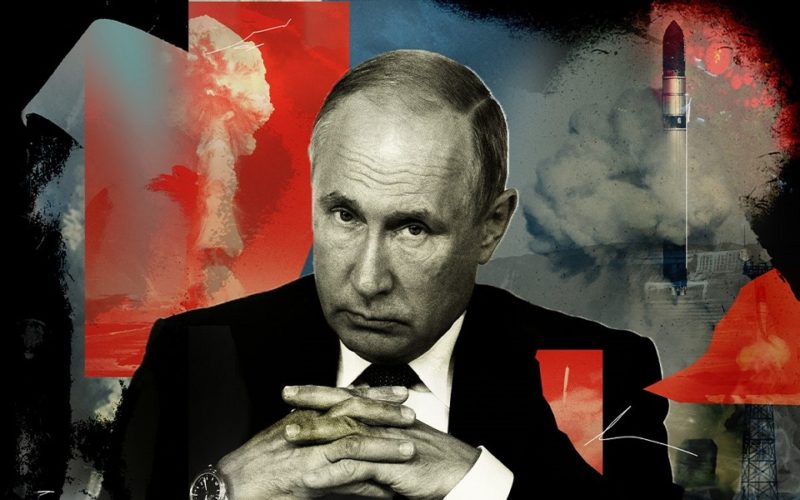Russian military doctrine of “escalate to de-escalate”
Since the beginning of Russia’s conflict in Ukraine, a portion of the Western elite and popular opinion—including politicians, experts, and commentators — has presented a variety of reasons why the West cannot or should not back a Ukrainian triumph. When the Russian invasion began in February, some argued that Russia’s military might rendered Western backing for Ukraine pointless. Then, as the conflict progressed, it was said that, while Moscow’s initial plan for a rapid assault was stopped, its forces would gradually but surely grind their way to victory. Now, as the Ukrainian military pulls Russian soldiers back, proponents of a settlement with Russia have landed on a new narrative: the US and its allies must go on support for Ukraine, lest they encircle Russian President Vladimir Putin and prompt him to blow up the globe.
The Russian military doctrine of “escalate to de-escalate”—that if Russia faces defeat due to Western conventional dominance, it will contemplate deploying nuclear weapons to force the West to back down—is at the root of this rising anxiety. Russia is now losing in Ukraine. While Moscow has threatened to go nuclear from the beginning of the conflict, Russian officials’ rhetoric has recently turned increasingly apocalyptic. Unsurprisingly, the US, Europe, and Ukraine are growing increasingly apprehensive that Russia will act out its nuclear threats.
Many Russian troops will die if Putin deploys nuclear weapons

For starters, Russia’s employment of nuclear weapons makes little practical sense. Tactical nuclear bombs are blunt weapons with unexpected outcomes. On the battlefield, the Ukrainian military has delegated operational decisionmaking to lower echelons and scattered its soldiers, reducing the size and significance of a target that could be annihilated by a nuclear detonation. Depending on where the hit occurs, the fallout from the bomb might also kill a large number of Russians. And, given the Russian military’s increasingly shambolic state, it’s uncertain if the Russian military could fully utilize whatever tactical advantage Russia could acquire from nuclear use. Indeed, news stories portray Russian soldiers as lacking the discipline and equipment required to conduct a conventional war, let alone a nuclear one.
It is also unclear if using nuclear weapons on a civilian target, such as Kyiv or another city, would shatter the Ukrainian will to fight. Terror bombing to demoralize a populace is rarely successful. During WWII, German, British, and American air forces all attempted and failed to shatter civilian morale from the air; US forces attempted again in North Vietnam. These initiatives had the opposite impact planned, as civilians rallied around the flag and grew even more motivated to battle on.
Even the study around the lone historical example of nuclear use in war, the Hiroshima and Nagasaki bombs, is frequently misinterpreted. True, Japan surrendered following the strikes. This fact, however, ignores two critical aspects. For starters, Japan was already losing the war, thus atomic use just accelerated rather than reversed tactical outcomes. Second, even after the nuclear attacks, the Japanese leadership deliberated whether to continue fighting.
If Russia used its nuclear weapons, it would face a severe strategic response. If Russia deploys nuclear weapons, the US and its allies have already threatened “catastrophic repercussions.” While the Biden administration has not stated publicly what these consequences may be, the US and its allies have a wide range of options available to them, including economic measures — such as seizing, rather than simply freezing, Russian assets — secondary sanctions, and even conventional strikes on Russian forces in Ukraine. Finally, a predictable, if improbable, consequence of a Russian nuclear strike would be the United States responding with its own nuclear strike.
Russia is losing old allies
Russia would face huge political repercussions if it used its nuclear weapons on Ukraine. Even among its friends, Russia’s foreign backing is already fragile. India’s Narendra Modi openly chastised Russia just a month ago; China has already expressed its worry; and Russia’s other partners, like Serbia and North Korea, have attempted to distance themselves from Moscow’s recent moves. All of this is already taking place, even before Russia crosses the still-theoretical nuclear threshold.
Finally, Russia’s nuclear acts would have long-term effects. If Moscow follows through on its threat, the worldwide security landscape will be irrevocably altered. If Russia’s gamble pays out, the Western alliance supporting Ukraine is as weak and split as Putin believes, and the West finally compels Ukraine to back down. This would very certainly spark a wave of nuclear proliferation, particularly in governments struggling to maintain their independence along the Russian border. Many of these newly nuclear powers would very certainly have their sights set on Russia. Again, if only to maintain their sovereignty.
If the risk fails and Ukraine continues to fight with Western assistance, the West may conclude that it can still fight through Russian nuclear use — albeit at exorbitant prices. If this happens, Putin would have lost his one remaining source of leverage: Western fear of his nuclear weapons. In any case, Russia loses in the long term.
Any sensible calculation would conclude that Russian nuclear use makes no strategic sense. But what if Russia, and especially Putin, is not fully rational? This is a serious possibility. After all, any cost-benefit analysis conducted prior to February would have determined that an attack of Ukraine made little strategic sense for Russia. Putin may be too angry or embarrassed to back down now. He may sincerely feel that Russia’s destiny is to reestablish its empire. Alternatively, he may be concerned that the domestic political ramifications of retreat exceed the risks of nuclear escalation.
However, if Putin is tempted to nuclear use out of embarrassment or fury, withdrawing support for Ukraine would have little effect on the war’s present direction. Even if the US persuaded Ukraine to put an end to the fighting, Russia would almost certainly feel embarrassed and angry. After all, many projected that this battle would continue only a few days, yet it has now lasted months. The Kremlin planned to “demilitarize and de-Nazify” Ukraine as a whole, not just the territory it now controls. And Russia will have lost tens of thousands of soldiers. The military strength of the country has been decimated. Making a deal, therefore, is unlikely to satisfy Putin’s emotional motivation for his nuclear threats; rather, it would only allow Putin and his inner circle more time to air their complaints, equip themselves, and try again.
Giving in to Russia’s nuclear blackmail will not fix Putin’s internal issues. Even if the conflict was put on hold or ended entirely, the Russian elite would be in disarray. Already, important Russians have died mysteriously, while others are asking on the defense minister to commit suicide and publicly mocking the high military levels. Several hundred thousand Russians have departed the country. Western sanctions continue to sting the Russian economy, and the effects are projected to worsen over time. Russia will have to reconcile hundreds of thousands of enraged veterans, all of whom have been desensitized to violence; some have very certainly committed war crimes. Even if none of these elements pose a danger to the government, if Putin wants to reduce domestic tensions, he will almost certainly require further concessions from the West, including sanctions relief. Threatening nuclear use is one of his final lines of defense.
Above all, if Putin is no longer a logical operator, as some think, Ukraine and its Western backers may be forced to continue fighting. After all, what is the alternative? The glue that binds any agreement together—certainly one to end the war—requires both sides to respect their long-term promises. How can one negotiate peace with a state that has demonstrated its irrationality? A long-term settlement may simply be out of the question at that time.
Of course, the United States and its allies should be ready if Russia decides to go nuclear. However, allowing their nuclear fears to dominate all of the other interests at stake in Ukraine makes no sense. Indeed, the only thing worse than Russian nuclear use is allowing such concerns to dictate and wreck Western and Ukrainian policy.








